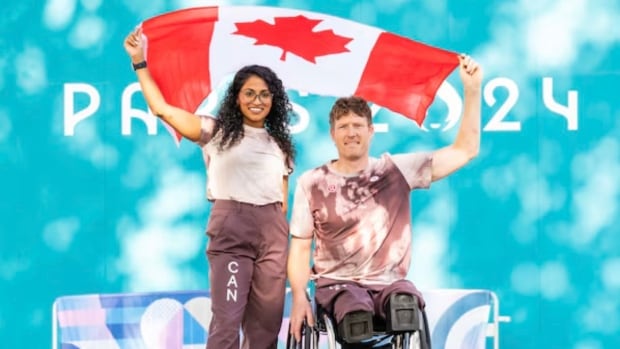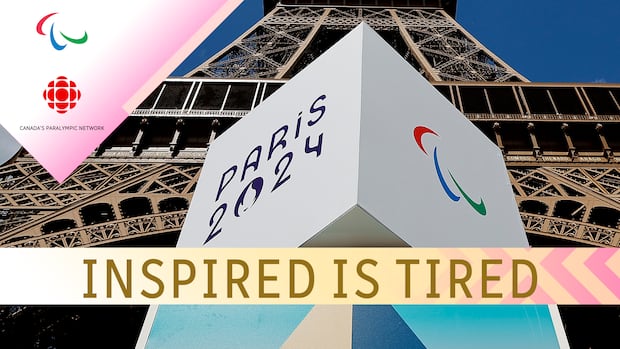
This is a web version of CBC Sports’ daily newsletter, The Buzzer. Sign up here to get it delivered to your inbox.
Two and a half weeks after the Paris Olympic Games came to a close, the City of Light is set to host the world’s largest event for athletes with various motor, sensory and intellectual disabilities and impairments.
The Paris 2024 Paralympic Games officially begin Wednesday with another imaginative opening ceremony featuring around 4,400 athletes from 182 delegations. There are no boats this time, but Paralympic athletes will get to experience their own open-air parade of nations as they march along the Champs-Élysées from the Arc de Triomphe to the Place de la Concorde. There, in front of some 65,000 spectators, they’ll take in a show directed by Thomas Jolly — the same guy who put together the opening and closing ceremonies for the Olympics. Here’s more on the festivities.
The Canadian flag will be carried by longtime Paralympians Pat Anderson and Katarina Roxon, who were awarded the honour today by the Canadian Paralympic Committee.
Anderson, a 45-year-old wheelchair basketball player, is appearing in his sixth Games. He helped Canada win gold in 2000, 2004 and 2012, when he scored 34 points to beat Australia in the final. That was the last time Canada reached the podium, but Anderson remains a key player. He scored 23 points in a must-win qualifying game last spring to give his team a spot in Paris.
Roxon, 31, is competing in her fifth Paralympic Games — the most ever by a Canadian women’s swimmer. She won an individual gold medal in 2016 in Rio and added a relay bronze three years ago in Tokyo.
Competition starts Thursday and runs for 11 days, through Sept. 8. There will be a total of 549 events in 22 different Para sports — including swimming, track and field, cycling, wheelchair basketball, wheelchair rugby, wheelchair tennis, wheelchair fencing, sitting volleyball, triathlon, canoe, rowing, equestrian, judo, goalball and boccia.
Canada sent 126 athletes to compete in each of those sports and more. Here are some fun facts about the team:
Anderson and Roxon aren’t the only ones with a ton of experience. Like Anderson, Brent Lakatos (track and field), Cindy Ouellet (wheelchair basketball) and Mike Whitehead (wheelchair rugby) are appearing in their sixth Paralympic Games. Amy Burk (goalball), Bo Hedges (wheelchair basketball), Trevor Hirschfield (wheelchair rugby) and Travis Murao (wheelchair rugby) will match Roxon with their fifth appearance. And a tip of the hat to boccia player Lance Cryderman, who’s returning for his second Games — 24 years after making his debut in 2000 in Sydney.
Bo Jackson might appreciate some of these athletes. In addition to her four previous Summer Paralympic appearances in wheelchair basketball, Ouellet also competed in the 2018 Paralympic Winter Games as a nordic skier. Mel Pemble, who’s expected to contend for the podium in her Summer Games debut in cycling, also appeared in the 2018 Winter Paralympics as an alpine skier before switching sports. Two other Canadians in Paris are multi-sport athletes. Para badminton debutant Yuka Chokyu made three appearances in wheelchair tennis, while Nathan Clement switched over to Para cycling after competing as a swimmer at the 2016 Games.
39 Canadians are making their Paralympic debut. That includes 47-year-old table tennis player Peter Isherwood, the oldest rookie on the team.
10 have won a Paralympic gold medal. They are swimmers Aurelie Rivard, Katarina Roxon and Danielle Dorris; track and field athletes Nate Riech, Greg Stewart and Brent Lakatos; and wheelchair basketball players Pat Anderson, Bo Hedges, Chad Jassman and Tyler Miller. Rivard is the leader with five career golds — including a pair in 2021 in Tokyo, where Canada finished with five gold and 21 total medals.
12 are multi-medallists. Lakatos leads the way with 11 medals (1 gold, 8 silver, 2 bronze) across five Paralympic Games in wheelchair track events ranging from the 100m to the 5,000m. He took four silvers in Tokyo, where he was named Canada’s flag-bearer for the closing ceremony. Rivard is next with 10 medals across three Games, followed by Anderson’s four. Here’s more on Rivard.
The oldest and youngest Canadian athletes will share a birthday during the Games. On Sept. 2, four-time Paralympic wheelchair fencer Ruth Sylvie Morel turns 68 while rookie swimmer Reid Maxwell turns 17.
WATCH | Let’s talk ParalympICKS with CBC Sports’ Michelle Salt and Brian Hnatiw:
Let’s talk ParalympICKS with CBC Sports Michelle Salt and Brian Hnatiw.
How to watch the Paralympics:
CBC’s live coverage begins Wednesday at 1:30 p.m. ET with the opening ceremony. You can watch it on the CBC TV network or stream it on CBC Gem, our Paris 2024 website and our Paris 2024 app.
Starting Thursday, each of those broadcast and streaming platforms will bring you competition via three daily live shows: Petro-Canada Paris Prime, hosted by Scott Russell, at 2 p.m. ET; Toyota Paralympic Games Primetime, hosted by Russell and Stef Reid, at 8 p.m. in your local time zone; and Canadian Tire Paralympics Tonight, hosted by Devin Heroux and Roseline Filion, at 11:30 p.m. local.
Digital coverage will also include daily episodes of Rise and Stream, highlighting the must-see events and Canadians to follow, and Hot Takes, featuring interviews with athletes and analysts. Both shows are available on the Paris 2024 site and on CBC Sports’ YouTube channel, Facebook, Instagram and X. Here’s more on CBC’s Paralympics coverage.
